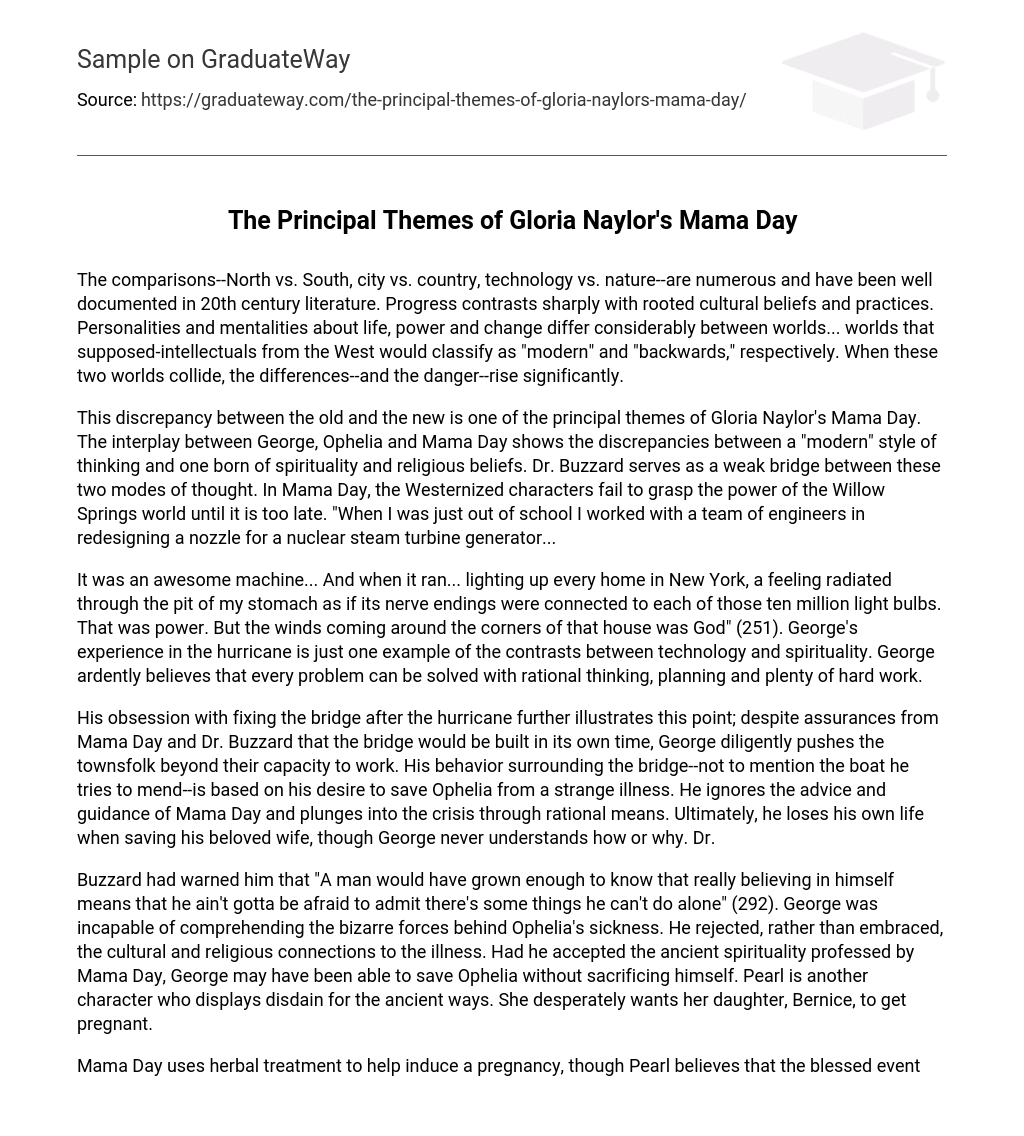The comparisons–North vs. South, city vs. country, technology vs. nature–are numerous and have been well documented in 20th century literature. Progress contrasts sharply with rooted cultural beliefs and practices. Personalities and mentalities about life, power and change differ considerably between worlds… worlds that supposed-intellectuals from the West would classify as “modern” and “backwards,” respectively. When these two worlds collide, the differences–and the danger–rise significantly.
This discrepancy between the old and the new is one of the principal themes of Gloria Naylor’s Mama Day. The interplay between George, Ophelia and Mama Day shows the discrepancies between a “modern” style of thinking and one born of spirituality and religious beliefs. Dr. Buzzard serves as a weak bridge between these two modes of thought. In Mama Day, the Westernized characters fail to grasp the power of the Willow Springs world until it is too late. “When I was just out of school I worked with a team of engineers in redesigning a nozzle for a nuclear steam turbine generator…
It was an awesome machine… And when it ran… lighting up every home in New York, a feeling radiated through the pit of my stomach as if its nerve endings were connected to each of those ten million light bulbs. That was power. But the winds coming around the corners of that house was God” (251). George’s experience in the hurricane is just one example of the contrasts between technology and spirituality. George ardently believes that every problem can be solved with rational thinking, planning and plenty of hard work.
His obsession with fixing the bridge after the hurricane further illustrates this point; despite assurances from Mama Day and Dr. Buzzard that the bridge would be built in its own time, George diligently pushes the townsfolk beyond their capacity to work. His behavior surrounding the bridge–not to mention the boat he tries to mend–is based on his desire to save Ophelia from a strange illness. He ignores the advice and guidance of Mama Day and plunges into the crisis through rational means. Ultimately, he loses his own life when saving his beloved wife, though George never understands how or why. Dr.
Buzzard had warned him that “A man would have grown enough to know that really believing in himself means that he ain’t gotta be afraid to admit there’s some things he can’t do alone” (292). George was incapable of comprehending the bizarre forces behind Ophelia’s sickness. He rejected, rather than embraced, the cultural and religious connections to the illness. Had he accepted the ancient spirituality professed by Mama Day, George may have been able to save Ophelia without sacrificing himself. Pearl is another character who displays disdain for the ancient ways. She desperately wants her daughter, Bernice, to get pregnant.
Mama Day uses herbal treatment to help induce a pregnancy, though Pearl believes that the blessed event occurred through natural means… with a pinch of scientific assistance from Dr. Smithfield. “Won’t be no midwives delivering her grandchild, Pearl is crowing, that baby is getting the very best. Once Bernice listened to her and stopped taking all that ‘bush medicine,’ see what happened? ” (149). Though she respects Mama Day as an individual matriarch, Pearl does not believe in her methods. She feels embarrassed by what is decidedly un-modern behavior, bordering on witchcraft.
Pearl does not honor the powers of her own culture and the possibilities that emerge from that power. She regards the “mojo” exhibited by Mama Day and exploited by Dr. Buzzard as little more than superstition and trickery. On that note, Dr. Buzzard connects the two worlds described in Mama Day. He promotes the subtle forces that influence African culture, but he manipulates them for his own personal gain. Mama Day loathes Dr. Buzzard more than any other character in the novel. “If you really had a conscience, you wouldn’t be selling them hoodoo bits of rags and sticks–and that watered-down moonshine as medicine, passing yourself off as a… (51). Though she does not complete her thought, her message is clear: Dr. Buzzard is abusing the ancient ways for money. He chooses to embrace neither Western medicine nor the true spirit of the cultural forms of healing. His shameless techniques contrast with the subtle, humble methods employed by Mama Day. Buzzard is not really a doctor, but he serves a useful purpose: he exemplifies both the material desires inherent in Western thought and the spiritual possibilities of his own culture.
In Mama Day, Gloria Naylor explores the relationship between the ideas common in urban, Western culture and the notions found in Willow Springs. George, Pearl and Dr. Buzzard all display traits found in “modern” societies. Furthermore, each of these characters clashes with the fundamental beliefs of Mama Day, which are rooted in religion and spirituality. They ignored because they did not understand, and the forces controlled by Mama Day went unnoticed and unheeded. Mama Day shows that, while there are benefits to the new ways, one must always respect and cherish the old thoughts and themes.





